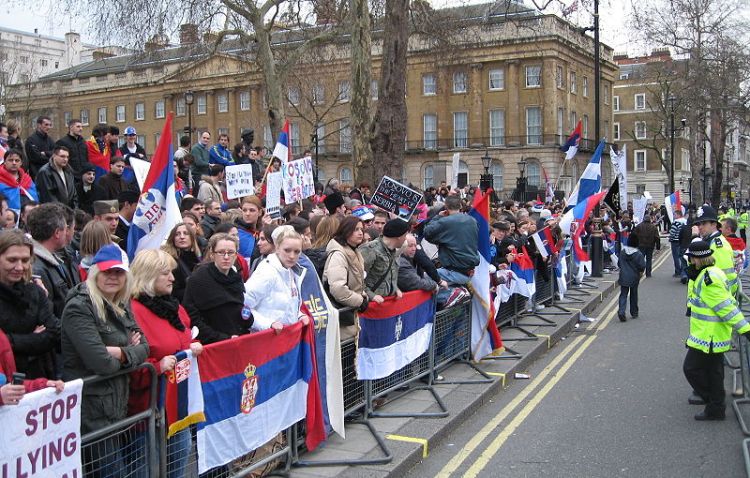UN Working Group Calls for Human Rights-Centered Economic Development in Serbia
Concluding their official visit to Serbia, experts Lyra Jakulevičienė and Robert McCorquodale highlighted both progress and persisting gaps in Serbia’s approach to responsible business practices.

The UN Working Group on Business and Human Rights has called on Serbia to ensure that its economic development agenda aligns with international human rights standards, emphasizing that growth must not come at the expense of human dignity, transparency, or accountability.
Concluding their official visit to Serbia, experts Lyra Jakulevičienė and Robert McCorquodale highlighted both progress and persisting gaps in Serbia's approach to responsible business practices. "There is an urgent need for stronger accountability and a culture of responsible business," the experts stated, noting that while Serbia has made commendable efforts to align its laws with EU environmental and labour standards, implementation and enforcement remain weak.
Weak Oversight and Lack of Independence in Corporate Monitoring
The experts expressed serious concern that institutions responsible for regulating corporate conduct lack the necessary independence, authority, and resources to effectively oversee business operations and prevent abuses. They emphasized that Serbia must strengthen its mechanisms to ensure that companies respect human rights in accordance with the UN Guiding Principles on Business and Human Rights (UNGPs).
"We are concerned that institutions tasked with monitoring corporate conduct and ensuring accountability seem to lack the necessary independence and effective remedies," the experts said, warning that inadequate oversight leaves room for corruption and human rights violations in both public and private sectors.
Corruption and Protests Following the Novi Sad Canopy Collapse
The visit took place against the backdrop of nationwide protests that have continued for nearly a year following the tragic collapse of the Novi Sad railway station canopy in 2024, which reportedly resulted from corruption and negligence in public procurement and construction. The Working Group said the incident underscored systemic weaknesses in transparency, accountability, and access to justice, particularly in public infrastructure projects.
"Such tragedies must serve as a wake-up call for authorities to ensure that safety standards, oversight, and public accountability are not compromised by corruption," said the experts.
Civil Society Under Pressure
The experts also voiced alarm over reports of intimidation and attacks against civil society actors, journalists, and community representatives who expose harmful corporate practices or call for transparency. "Civil society plays a vital role in holding businesses accountable and ensuring that those affected by corporate misconduct have a voice," they said.
The Working Group urged the Serbian authorities to protect human rights defenders and ensure freedom of expression and association, emphasizing that such protection is crucial for an environment of trust and accountability in both business and governance.
Inclusion, Environmental Safeguards, and Community Consultation
Calling for a human rights-based approach to development, the UN experts stressed that major industrial and infrastructure projects should be approved only after comprehensive environmental and human rights impact assessments, public disclosure of data, and meaningful community consultation.
"Economic development must take into account risks to people and the planet," they said. "Meaningful consultation with communities is essential to protect human rights, prevent harm, and ensure sustainability."
However, the Working Group reported that some communities, including those in Bor and Loznica, have been excluded from decision-making and denied access to independent information about projects that affect their environment, livelihoods, and health.
Labour Rights and Worker Protections
While acknowledging Serbia's positive steps in non-discrimination policies, occupational safety, and protection for victims of trafficking, the experts warned that challenges remain. Labour inspections are weak, foreign workers are vulnerable to exploitation, and trade union activities face bureaucratic and legal barriers.
The experts urged the Serbian government to strengthen preventive mechanisms, empower workers' organizations, and ensure that corporate accountability mechanisms are transparent and accessible.
Engagement and Next Steps
During their visit, the experts met with a wide range of stakeholders — including government officials, businesses, trade unions, local communities, and civil society organizations — in Belgrade, Bor, Loznica, Novi Sad, and Zrenjanin.
Their final report will be presented to the UN Human Rights Council in June 2026, offering detailed recommendations for aligning Serbia's business practices with human rights standards and EU accession requirements.
"The path to sustainable economic development must be paved with respect for human rights, environmental stewardship, and accountability," the experts concluded. "Serbia's progress in these areas will determine not only its economic future but also the well-being and trust of its people."
ALSO READ
-
Students March Across Serbia to Demand Justice for Train Disaster Victims
-
Chaos at Caciland: President's Camp Attacked Amid Serbia Unrest
-
Unrest in Belgrade: Shots Fired Outside Serbia's Parliament
-
India Secures Seat at UN Human Rights Council for 2026-28
-
Serbia's Strategic Moves Amid U.S. Sanctions on NIS









